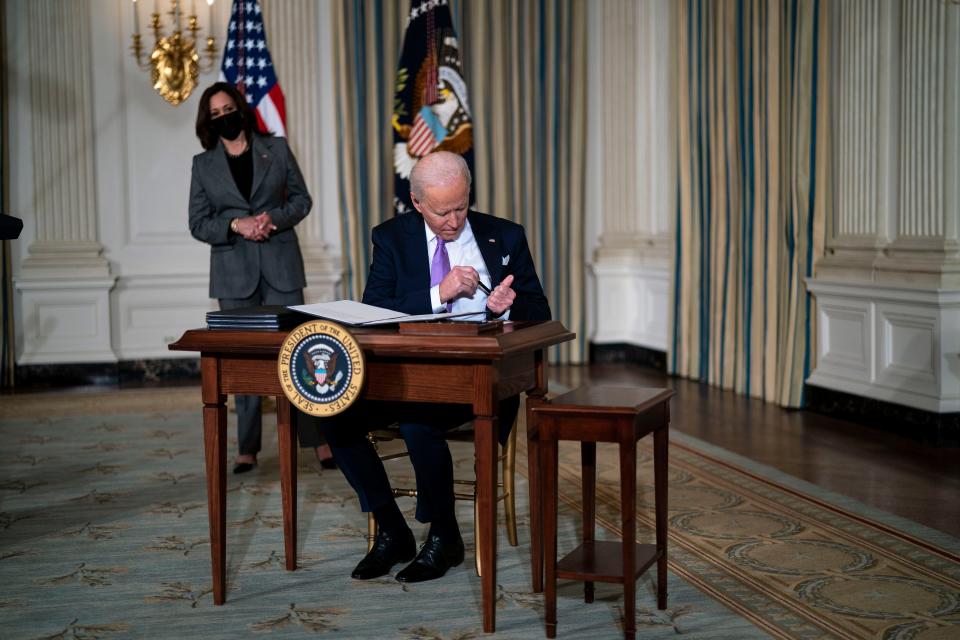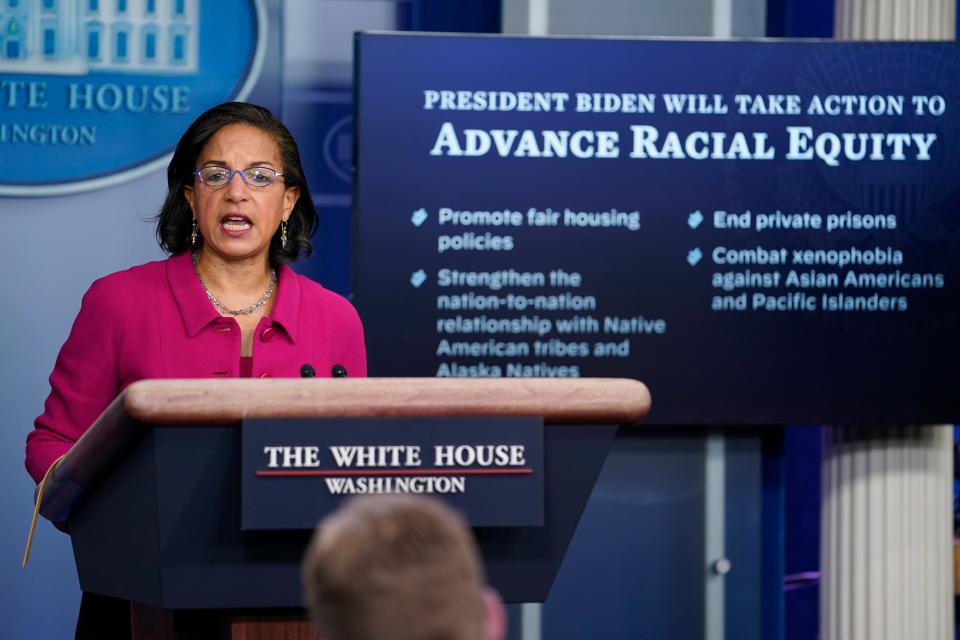Biden addresses racial bias in housing, directs DOJ to phase out use of private prisons in new executive orders
WASHINGTON – President Joe Biden on Tuesday directed his administration to address racial bias in housing programs and end the Justice Department's use of private prisons as he emphasized what he said will be an all-of-government approach to creating a more equitable society.
"We need to make equity and justice part of what we do every day," Biden said, "today, tomorrow and every day."
He signed four new executive orders, building on steps taken in his first week in office as part of his campaign promise to combat racial inequities.
In addition to directing the phase-out of private prisons, Biden recommitted the government to respecting tribal sovereignty, directed agencies to mitigate racial bias in federal housing policies and to address xenophobia and violence against Asian Americans and Pacific Islanders.

On Biden's first day in office, he tasked every federal agency with reviewing its programs and delivering an action plan within 200 days to address any disparities in policies and programs.
More steps are expected, including on criminal justice and police reform.
But Susan Rice, the head of Biden’s Domestic Policy Council, said the administration's approach will be substantially through its economic agenda.
"These aren't feel-good policies. The evidence is clear. Investing in equity is good for economic growth," Rice said. "And it creates jobs for all Americans."
She cited estimates that the economy has lost $16 trillion over the last 20 years because of racial discrimination.
Biden and Rice stressed that the equality agenda is not aimed solely at communities of color but is designed to help all marginalized communities, including people with disabilities, religious minorities, members of the LGBTQ community and anyone living in persistent poverty – whether in urban, rural or suburban areas.
Black voters were instrumental in helping Biden win the primary in South Carolina, which provided critical momentum for his struggling campaign. In the general election, voters of color helped Biden pull out wins in battleground states like Pennsylvania.
“Of course, he made it a priority … He won the election because of African Americans,’’ said Ohio Sen. Sherrod Brown, who applauded the moves and plans to prioritize racial justice issues through the Banking, Housing and Urban Affairs Committee. “He’s always supported civil rights his whole career."
The NAACP had called on Biden to create a policy "czar" position to put one person in charge of addressing racial justice and equity issues.
Derrick Johnson, president and CEO of the NAACP, said Tuesday it was important to see the issues embedded in the administration’s domestic policy portfolio.
“This administration has followed through on what it signaled as the priority,’’ Johnson said. “The next step is for us as an organization along with many partners to also push for Congress to do the same.''

The Racial Equity Anchor Collaborative, a coalition of racial justice and civil rights organizations, pushed Tuesday for Biden to establish a White House Office on Racial Equity and Inclusion to coordinate all actions. But administration officials emphasized what they said is an unprecedented move to embed racial equity throughout all agencies.
"Advancing equity is everybody’s job," said Rice, who is leading the efforts. She said the mission is personal for her, as the descendant of immigrants from Jamaica and enslaved Americans.
Marc Morial, president of the National Urban League, said Biden’s initial steps and Rice’s role indicates racial justice will not be marginalized in the new administration.
“It’s not time to pop a cork or spike the ball. No way. Don’t get me wrong,” he told USA TODAY. “But these are things that we have encouraged, asked for and demanded. So it looks like we’re being heard at this stage.”

Biden wants his team to serve as a model on diversity, including hiring, purchasing, data and access. He's called racial inequality one of the four “converging crises” facing the nation.
Eric Rodriguez, senior vice president of policy and advocacy at UnidosUS a national Latino civil rights organization, praised Biden’s focus on housing, which he called a “sleeper issue.’’
Addressing housing discrimination is critical for communities of color, he said.
Rodriguez said the federal government should already be racially sensitive and culturally competent “so we shouldn’t have to do this. But we do because we know that systemic racism is throughout the government.”
The executive order to end contracts with private prisons applies only to the Department of Justice and not other federal agencies, including immigration detention facilities run by U.S. Immigration and Customs Enforcement.
About 9% of the 151,646 offenders in Justice Department custody are housed in nearly a dozen contract prisons.
Holly Harris, head of the Justice Action Network which advocates for criminal justice reform, said mass incarceration won't end while companies can still profit from it.
"Will this cure all that ails our broken justice system? Of course, not," she said of Biden's executive order. "Is it a critical step in the right direction? Absolutely."
A trade group representing private prisons called the executive order a “misguided attempt to blame longtime government contractors for a ‘mass incarceration’ problem they actually play zero role in driving.”
Alexandra Wilkes, spokesperson for the Day 1 Alliance, said the change could worsen conditions for the incarcerated who may get shunted off to overcrowded state and local jails that have lower standards than federal facilities.
In 2017, the Trump Justice Department rolled back an Obama administration directive to end the use of private prisons.
Less than a year before the decision, then-Deputy Attorney General Sally Yates described the private facilities as less safe and “comparing poorly” with the government-run institutions in the country’s largest prison system.
“They simply do not provide the same level of correctional services, programs and resources,” Yates wrote at the time.
In 2016, a review by the Justice Department’s inspector general found that incidents involving inmate discipline, the recovery of contraband, including cellphones and the frequency of facility lockdowns were more common in contract prisons than in government-run facilities.
Contributing: Kevin Johnson, USA TODAY.
This article originally appeared on USA TODAY: Joe Biden to sign new executive orders laying out racial equity agenda
